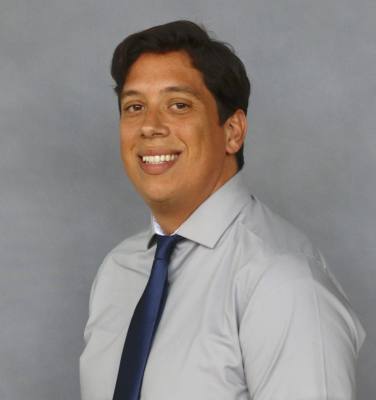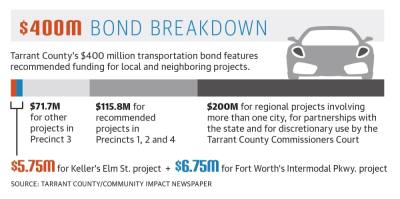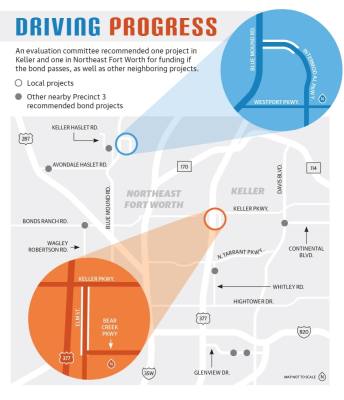For voters in Keller and Northeast Fort Worth, two projects in particular stand a strong chance of being funded.
Upgrades to South Elm Street in Keller and Intermodal Parkway in the Alliance area are within the area covered by Community Impact Newspaper, and they were recommended by a project evaluation committee assembled by the Tarrant County Commissioners Court. The committee met during the summer and presented its findings in August.
The proposition—Proposition A—will be decided with a simple yes or no vote. It would be the first transportation bond program approved by Tarrant County voters since 2006. That bond program went on to fund more than 60 projects that have since been completed, and a half-dozen or so are nearing completion.
G.K. Maenius, the county administrator for Tarrant County since 1988, said now was the right time to put another bond program before the voters due to the county’s growth.
Data released from the 2020 census shows Tarrant’s population grew by 16.7%—an increase of more than 300,000 residents—between 2010 and 2020. In June, population estimates by the Census Bureau ranked Fort Worth as the nation’s 12th largest city.
“We’re one of the fastest-growing counties in the United States,” Maenius said. “We feel that there’s a responsibility to provide good roads for transportation.”
Precinct perks
The way the proposed transportation bond has been structured splits the $400 million into two pots, with $200 million being set aside specifically to fund projects pitched by Tarrant’s cities in April, according to county documents outlining the bond program’s policy.
The projects pitched by the municipalities require a funding match, with the county only able to pay up to 50% of the cost. Maenius said the county received proposals for 196 projects from 24 municipalities.
From those submissions, the evaluation committee used criteria outlined by the bond policy and the court to ultimately identify 33 projects, amounting to $199.5 million in proposed bond program matching funds. Those projects were recommended to the Commissioners Court during a presentation Aug. 3.
Maenius said it is his belief that the court will honor the recommendations, noting the committee included appointees from all five members of the court.
Precinct 3—which includes Keller and Northeast Fort Worth—received the largest volume of recommended projects and allotment of recommended funding. Projects recommended for the precinct—which spans northeast Tarrant, north central Tarrant and the eastern portion of northwest Tarrant—totaled just over $84 million, or 42% of the pot.
In addition to those in Keller and Northeast Fort Worth, the recommendations include projects pitched for Colleyville, Southlake, North Richland Hills, Richland Hills, Watauga and northwest Fort Worth.
Commissioner Gary Fickes, who represents Precinct 3, noted that his precinct includes areas nearing buildout as well as some of the fastest-growing parts of the county. He said he was pleased with the process.
“This is something that’ll benefit our citizens,” Fickes said.
Local projects
The South Elm Street project pitched by the city of Keller is part of its plans for the Old Town Keller area. Keller seeks $5.75 million in funds from the bond program. According to Alonzo Liñán, Keller’s Director of Public Works, the road—which is located east of U.S. 377 and runs parallel to the thoroughfare—is already in need of several infrastructure improvements. Liñán said city officials see that necessary drainage, sewage and pavement work as an opportunity to leverage the bond funds to add upgrades that include on-street parking, increased pedestrian walkways and aesthetic improvements.
The project would start where South Elm Street meets Keller Parkway at its northernmost point and go south to Bear Creek Parkway.
“We submitted [it] to the county for consideration because of the economic development potential,” Liñán said. “There's a larger mosaic that Elm Street fits into.”
Meanwhile, the work proposed for Intermodal Parkway would come at a cost of $6.75 million from the transportation bond program. Documents prepared by the city of Fort Worth describe the road, which connects the Burlington Northern Santa Fe Railway and the Old FM 156, as “the most important freight corridor in AllianceTexas.”
“This roadway connects North America’s largest inland port, the AllianceTexas Global Logistics Hub, and its supply chain logistic partners to major employers, communities and other transportation systems, including air, rail and interstate highway,” the documents stated.
The other pot
The other $200 million, as outlined by the transportation bond program’s policy, is further divided into two more groups.
First, there is $125 million dedicated to countywide initiatives and partnerships that are more regional in nature. Maenius explained these projects would be brought directly to the court and that, unlike the call for projects issued to cities, there have been no formal discussions on what these projects might be.
The remaining $75 million falls under a “discretionary” label. Each member of the court—the four precinct commissioners and the Tarrant County judge—would have $15 million reserved to use at their discretion, to be used with court approval.
With projects from either pot of $200 million, however, Maenius said residents should not expect them to break ground immediately.
“These are fairly large projects; they’re going to take more than a year to do,” Maenius said. “We will sell debt, and we will not increase the tax rate. Monies that we have that become available, we will go ahead and we will work through this list of projects.”







